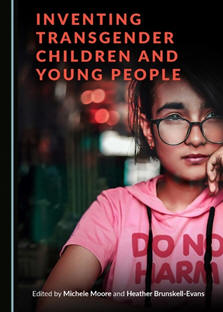Catholic Medical Quarterly Volume 70(1) February 2020
Book reviews
Inventing Transgender Children and Young People.
Edited by Michele Moore and Heather
Brunskell-Evans.
Published Cambridge Scholars Publishing.
Reviewed by Pravin Thevathasan
 This
is an important read for all those concerned by the rapid rise in children
claiming that they are in the wrong body. The authors come from different
disciplines including psychiatry, psychology, sociology and philosophy.
They cannot be dismissed as conservatives. Indeed, many contributors
appear to write from a feminist perspective. What is apparent is that they
care about children with gender dysphoria. There is nothing hateful to be
found here.
This
is an important read for all those concerned by the rapid rise in children
claiming that they are in the wrong body. The authors come from different
disciplines including psychiatry, psychology, sociology and philosophy.
They cannot be dismissed as conservatives. Indeed, many contributors
appear to write from a feminist perspective. What is apparent is that they
care about children with gender dysphoria. There is nothing hateful to be
found here.
Parents are often excluded because the experts claim that only the opinion of the child matters. In going down this pathway, there is a risk that mental health issues are excluded. The role of peer pressure is also possibly ignored. The parents of Elsa write: " At 17 years, she came to me as transgender. I was totally shocked as she never showed any signs of being a boy. Two of her childhood friends had come out as transgender and through immersing herself with happy trans stories they shared on YouTube and Reddit, she became a follower of the trans-cult."
That story is repeated over and over again. The writers are concerned that young people are affirmed in their gender self-identification without rigorous clinical assessments. Debate is being shut down. If a child is told that it is best to wait before making such a vital decision, the clinician will be told that the child is at risk of developing depression. Or worse.
Psychiatrist David Bell writes that "Many services have championed the use of medical and surgical intervention with nowhere near sufficient attention to the serious, irreversible damage this can cause and with very disturbingly superficial attitudes to the issue of consent in young children." Psychiatrist Roberto D'Angelo writes: " When we encourage children to narrow their focus on discovering their true gender self, do we at the same time encourage them not to think about more profound reasons for why they may feel so alienated, or despairing or disempowered?"
Patrick is described as someone who transitioned, only to later detransition: " Once I started transitioning, I grew suicidal because I started to develop a sense of self which bore no connection to my physical reality...sex, I had come to know, is biological and cannot be changed."
Lisa Marchiano chooses to use the word "hysteria" to describe the rapid rise in transgender children and young people.The term seems to encapsulate the role that contemporary culture plays in shaping and spreading psychological symptoms. Medicalizing a psychological problem leads to a medicalized treatment pathway.
From a Catholic perspective, I have certain disagreements with what some of the contributors have to say. But let the debates and discussions continue. That is surely part of our democratic heritage. Some of the contributors have been punished for expressing their expert opinions. There is a certain irony in promoting physical conversion therapy for transgender people who may be same sex attracted but suppressing any form of non-judgmental reparative therapy for other same sex attracted people.
This is a much needed, measured contribution to the debate over transgender people. Whatever one's views, it is likely to be an informative read.
